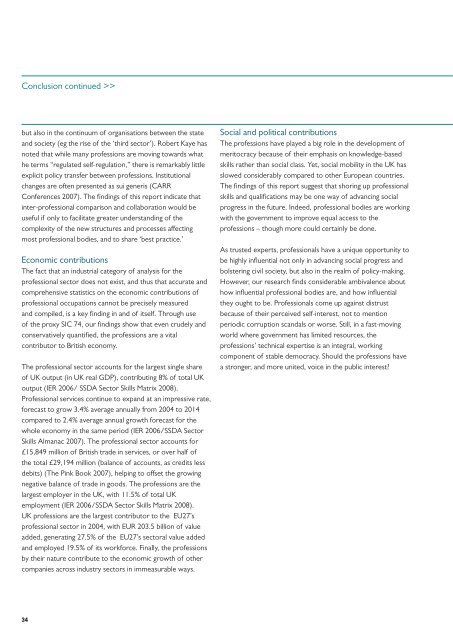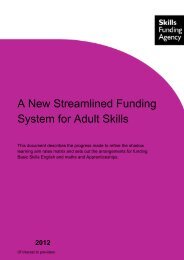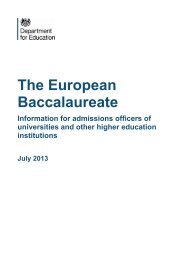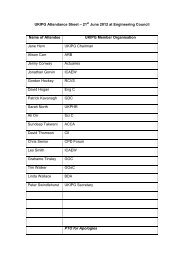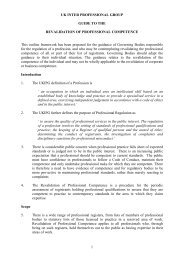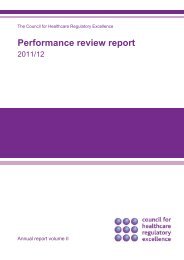BRITISH PROFESSIONS TODAY: THE STATE OF ... - Property Week
BRITISH PROFESSIONS TODAY: THE STATE OF ... - Property Week
BRITISH PROFESSIONS TODAY: THE STATE OF ... - Property Week
Create successful ePaper yourself
Turn your PDF publications into a flip-book with our unique Google optimized e-Paper software.
Conclusion continued >><br />
but also in the continuum of organisations between the state<br />
and society (eg the rise of the ‘third sector’). Robert Kaye has<br />
noted that while many professions are moving towards what<br />
he terms “regulated self-regulation,” there is remarkably little<br />
explicit policy transfer between professions. Institutional<br />
changes are often presented as sui generis (CARR<br />
Conferences 2007). The findings of this report indicate that<br />
inter-professional comparison and collaboration would be<br />
useful if only to facilitate greater understanding of the<br />
complexity of the new structures and processes affecting<br />
most professional bodies, and to share ‘best practice.’<br />
Economic contributions<br />
The fact that an industrial category of analysis for the<br />
professional sector does not exist, and thus that accurate and<br />
comprehensive statistics on the economic contributions of<br />
professional occupations cannot be precisely measured<br />
and compiled, is a key finding in and of itself. Through use<br />
of the proxy SIC 74, our findings show that even crudely and<br />
conservatively quantified, the professions are a vital<br />
contributor to British economy.<br />
The professional sector accounts for the largest single share<br />
of UK output (in UK real GDP), contributing 8% of total UK<br />
output (IER 2006/ SSDA Sector Skills Matrix 2008).<br />
Professional services continue to expand at an impressive rate,<br />
forecast to grow 3.4% average annually from 2004 to 2014<br />
compared to 2.4% average annual growth forecast for the<br />
whole economy in the same period (IER 2006/SSDA Sector<br />
Skills Almanac 2007). The professional sector accounts for<br />
£15,849 million of British trade in services, or over half of<br />
the total £29,194 million (balance of accounts, as credits less<br />
debits) (The Pink Book 2007), helping to offset the growing<br />
negative balance of trade in goods. The professions are the<br />
largest employer in the UK, with 11.5% of total UK<br />
employment (IER 2006/SSDA Sector Skills Matrix 2008).<br />
UK professions are the largest contributor to the EU27’s<br />
professional sector in 2004, with EUR 203.5 billion of value<br />
added, generating 27.5% of the EU27’s sectoral value added<br />
and employed 19.5% of its workforce. Finally, the professions<br />
by their nature contribute to the economic growth of other<br />
companies across industry sectors in immeasurable ways.<br />
Social and political contributions<br />
The professions have played a big role in the development of<br />
meritocracy because of their emphasis on knowledge-based<br />
skills rather than social class. Yet, social mobility in the UK has<br />
slowed considerably compared to other European countries.<br />
The findings of this report suggest that shoring up professional<br />
skills and qualifications may be one way of advancing social<br />
progress in the future. Indeed, professional bodies are working<br />
with the government to improve equal access to the<br />
professions – though more could certainly be done.<br />
As trusted experts, professionals have a unique opportunity to<br />
be highly influential not only in advancing social progress and<br />
bolstering civil society, but also in the realm of policy-making.<br />
However, our research finds considerable ambivalence about<br />
how influential professional bodies are, and how influential<br />
they ought to be. Professionals come up against distrust<br />
because of their perceived self-interest, not to mention<br />
periodic corruption scandals or worse. Still, in a fast-moving<br />
world where government has limited resources, the<br />
professions’ technical expertise is an integral, working<br />
component of stable democracy. Should the professions have<br />
a stronger, and more united, voice in the public interest?<br />
34


